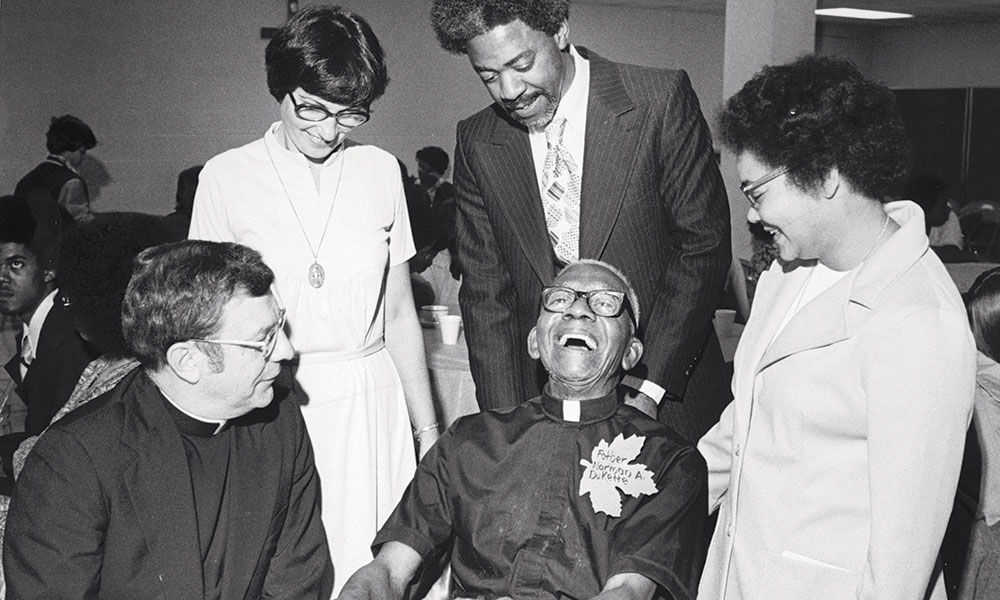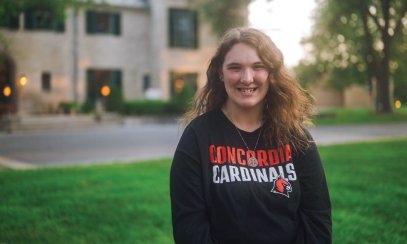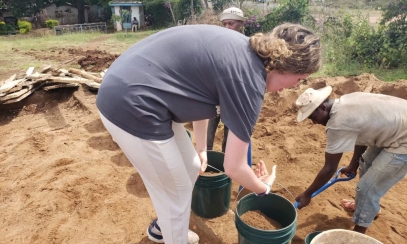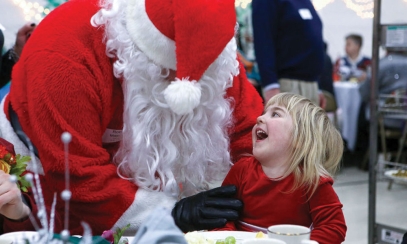
One, Catholic, Apostolic & Black
November is Catholic Black History Month. Christ the King Parish in Flint is the Diocese of Lansing’s only African-American majority parish. FAITH’s Renee Lapham Collins has been finding out the history — and the present work of the parish.
November is Catholic Black History Month. Christ the King Parish in Flint is the Diocese of Lansing’s only African-American majority parish. FAITH’s Renee Lapham Collins has been finding out the history — and the present work of the parish.
Christ the King Catholic Church sits on several acres off Seymour Avenue in Flint. It is surrounded by the detritus of urban decay — abandoned buildings, empty parking lots, housing projects and homeless souls wandering along a trail of tears in a city that has been declining for decades.
But inside its 1970s-era brick walls is hope — a legacy of community involvement and evangelization that started with the first Black priest in Michigan: Father Norman DuKette.
“Father DuKette was everywhere,” recalls lifelong parishioner and choir director Helen Hobson. “He was all over Flint. He was in barber shops, smoke shops, everywhere, talking about Jesus. He learned about the people in this city, and he’d walk downtown to stores and tell them about the needs of Christ the King.”
Today, the parish has 135 families, 70 percent of whom are Black. It is the Diocese of Lansing’s only majority African-American parish.
James Rouse, Lloyd Witt and Hobson all grew up in the parish, and for them, DuKette was a larger-than-life person who taught them to be fearless in their evangelization efforts.
Today, the trio has a lifetime of memories about their pastor and how he built a vibrant parish despite the many obstacles he encountered.
“He got us out into the community; he taught us how to connect,” Rouse says. “We got together with the community and started the South Side Police Station, although it closed when COVID came. We’ve been active in getting people to vote and not just sit there and complain. We use our activity center to do a phone bank and invite people to get to the polls. We’ve been very active with education in the community, making sure the curriculum matches what the kids need.”
Rouse attributes the spirit of activism to DuKette’s influence.
“We’ve also been involved with ‘Stop the Violence’ and hosted an active shooting seminar so we would know what to do in case somebody came in actively shooting in the church,” he says. “We’ve learned what we need to do.”
Witt recalls DuKette’s relentless efforts on behalf of his parish, especially when it came time for Christmas.
“There were so many kids,” he recalls. “The economy wasn’t good. So he would go down to Sears and say, ‘They need undershirts and underpants. Can you help me out?’ And they would say, ‘Well, we have some, not the top ones, but with imperfections.’ And Father DuKette would say, ‘Well, you keep those. I want the nice ones. Let’s get the nice ones.’ And he did.”
The parish has weathered cataclysmic problems, mirroring the social and economic decline of the city — first with the departure of General Motors, then the water crisis and, most recently, the pandemic.
“This used to be a humongous city with probably 10 parishes,” says Father Matthew Bonk, associate pastor at St. John Vianney. “But when a city center suffers economically or in any other way, with crime or the water issues we’ve had here, planning for church growth is tough. One of the hopes is that Christ the King would be a place that Black Catholics could come to wherever they are, even if they are living in towns nearby.”
Father Thomas Firestone pastors St. John Vianney, the parish administrative body for Christ the King, Our Lady of Guadalupe and St. Matthew parishes. Christ the King has just one weekend Mass, Sunday at 9 a.m. It’s one of Bonk’s regular weekend responsibilities.
“When Bishop Boyea sent me here, there were not a lot of priests who wanted to come to Flint,” says Bonk, a Redemptorist priest who grew up in the diocese.
The socio-economic problems in Flint today are not much different than those encountered by DuKette when he arrived in 1929. Segregation, racism and poverty were as much a part of the lives of that fledging parish as they are today. DuKette built the first church on Clifford Street, but he was forced out two decades later in favor of a freeway exchange for Interstates 475 and 69, visible from the new church off Seymour Avenue. He retired in 1971 and died in 1980.
Christ the King has lost a few members to the pandemic, and it still streams Sunday Mass for those who cannot be there in person. But they are gaining new members, particularly from local parishes that have been shuttered. There are also regulars to social programs, like the weekly fish fry dinner.
“It’s a mostly year-round thing,” Bonk explains. “It’s reminiscent that, in some cultures, the church is not only where you go on Sunday but also part of your community life. This is a way for people to gather, come together and form a community. This is why we gather. We come to the church, and we do things together.”



